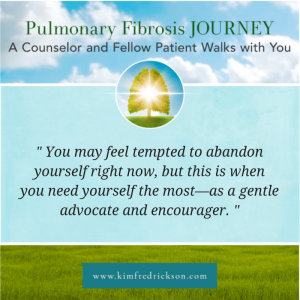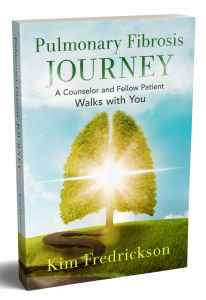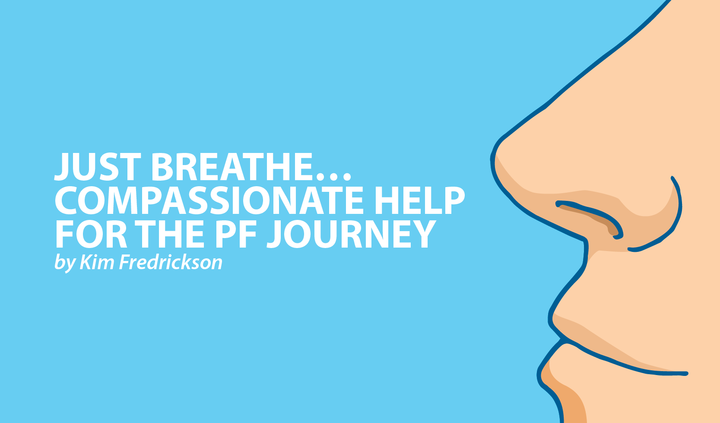Self-compassion Helps Us Deal with Pulmonary Fibrosis

Pulmonary fibrosis patients need all the compassion we can get. It turns out that the most important person to give us compassion is … ourselves!
A growing body of work demonstrates the powerful effects of self-compassion on our health. Studies have shown that people with a high level of self-compassion don’t get down on themselves for being sick. Instead, they talk to themselves with compassion and advocate for themselves. Self-compassion helps them regulate emotions, comply with medical recommendations, and take better care of themselves. People who practice self-compassion cope better with stressful events. They may become less depleted by illness and have more resources to devote to self-care and living their lives to the fullest.
Self-compassion is especially important to pulmonary fibrosis patients and their families. Medical tests, doctor visits, long-term management of this illness, pulmonary rehab, and healthy yet challenging lifestyle changes are often difficult, unpleasant, and stressful.
We grieve and adjust to the worsening of our lungs and the effect that has on our lives. It is important to respond to ourselves with kindness rather than judgment.

What is self-compassion?
Self-compassion teaches us to be kind to ourselves when we fail by treating ourselves with the caring support we would give another who struggles. We acknowledge our mistakes with the grace that understands we have worth and value, warts and all. When we relate to ourselves with compassion, we treat ourselves as we would a friend who is scared, confused, or learning something new.
Practicing self-compassion helps us handle our humanness and the situations we are in with empathy, concern, understanding, and kindness. It helps us soothe our mistakes and regrets and repair hurts with our loved ones. Treating ourselves with kindness gives us the freedom to learn what we don’t know and find solutions.
Lack of self-compassion is linked to depression, anxiety, low self-esteem, problems in relationships, vulnerability to the opinions of others, and difficulty recovering from painful experiences. Walking around with an inner critic who judges us for mistakes in the past and struggles in the present is quite depressing and produces a lot of anxiety. Imagine instead that you have a compassionate friend on the inside who empathizes with you, helps you take care of yourself, and shows you how to be kind to yourself.
Self-compassion has helped me so much
 Practicing self-compassion has made a huge difference in my life and my ability to navigate PF. This is why I weave the theme of self-compassion throughout my new book, “Pulmonary Fibrosis Journey: A Counselor and Fellow Patient Walks with You.” Talking to myself kindly about what I’m going through takes the edge off my suffering and enables me to take better care of myself. I also have more energy to give to my family and the PF community.
Practicing self-compassion has made a huge difference in my life and my ability to navigate PF. This is why I weave the theme of self-compassion throughout my new book, “Pulmonary Fibrosis Journey: A Counselor and Fellow Patient Walks with You.” Talking to myself kindly about what I’m going through takes the edge off my suffering and enables me to take better care of myself. I also have more energy to give to my family and the PF community.
I recently took a trip to my dad’s memorial service. It was exhausting just to get there. I was getting down on myself for being so tired and not being able to do much to help my sister who was handling the service. It took all I had to get there and greet attending family and friends. It was a lovely service, but I just wanted to get back to the hotel and lie down, even though there were people I wanted to talk to. After starting to get down on myself, I paused and decided to respond to myself differently. I said:
- I’m overwhelmed right now, and with good reason.
- It’s a minor miracle I was even able to come.
- I’m doing the best I can, and that’s good enough.
- It’s normal for me to be tired from all this activity and from grieving the loss of my father.
- I’m so glad I came to honor my dad, even if I didn’t get to talk with everyone.
It really helped to talk to myself with compassion and kindness.
Self-compassion helps with unrealistic expectations
We often expect ourselves to be good at situations we’ve never been through before, including how to handle our disease. That’s nuts! I give myself permission to not know how to handle having PF. Everything we are going through is new. We have no idea what we’re doing. We make mistakes; we do things wrong. Everything is a process, including learning about and living with this disease. I’ve learned what I know from trial and error. Everyone does. Treat yourself with kindness about this journey and become a compassionate friend to yourself.
I’d love to hear from you!
Has being kind to yourself helped you weather this disease? What do you do or say to yourself to be a compassionate friend rather than a harsh critic?
Please leave a comment below and share with those who could benefit via email or on social media.
***
Note: Pulmonary Fibrosis News is strictly a news and information website about the disease. It does not provide medical advice, diagnosis, or treatment. This content is not intended to be a substitute for professional medical advice, diagnosis, or treatment. Always seek the advice of your physician or other qualified health provider with any questions you may have regarding a medical condition. Never disregard professional medical advice or delay in seeking it because of something you have read on this website. The opinions expressed in this column are not those of Pulmonary Fibrosis News or its parent company, Bionews Services, and are intended to spark discussion about issues pertaining to pulmonary fibrosis.








Missy Harrington
Hi Kim,
I am healthy but my husband has struggled with IPF since his diagnosis in 2011. This is such a nasty disease for him as he's lost two older sisters to the same thing. Knowing how they suffered before dying has got to be terrifying but he hides it well. He was able to have a single lung transplant in 2014 and has done pretty well since then. His doctor told him he was very fortunate because he only had about a 2 week outlook for survival before that. The transplant was life-saving but brings a whole bag of other medical issues to deal with as well. He was always strong and worked hard and now finds himself much weaker and dependent on oxygen and can no longer work as before. He is somewhat bitter with himself and I know it is due to IPF entirely. He's a very optimistic 75 year old and loves life. I struggle to hold down a job and also take care of his needs. We live in a remote area and it's an 8 hour drive (one way) to see his doctors and I have to do all the driving at this point...14,000 miles since May 1 this year. I find myself resenting the fact that I have to do the jobs he used to take care of around the house but no longer can do. Most of our disagreements are over his eating habits and things he won't do for himself. IPF is hard on everyone connected to someone with this terrible disease; I don't think I'd handle it nearly as well as he does. Just connecting with folks and picking up tips on how to manage IPF is helping out. Thanks for all that you do, I appreciate it.
Missy
Kim Fredrickson
Hi Missy,
Thanks for your comment. So sorry for the very awful ways that IPF has affected you and your family. I know how hard it is on patients and caregivers alike. Both your and your husbands feelings and reactions are so normal. it is so very hard, and we are all doing the best we can. Good to hear from you. We're in this together...
James Huls
Kim, I just finished your new book, and found it very helpful. I am male and am 74 yrs old. I have RA, and it has affected my lungs with PF. I was diagonosed 2 yrs ago with PF after having bronchitis twice really close together, my family dr heard the crackling in my lungs and directed me to pulmonogist. Testing to see if I qualify for oxygen per Medicare guidelines.
I will never quit the fight of this terrible disease, thanks for all the valuable and usable info in your book. My prayers for all.
Kim Fredrickson
Hi James,
Thanks so much for your encouraging comment about my book. I'm so glad it is a help to you. Love your attitude! We'll keep fighting this disease together!!! Prayers for you as well.
elk315
I am my worst critic and self-compassion is what I really need to practice. Have not finished your book yet, but really like the way you talk to yourself compassionately like you did above. Kim, you are an excellent role model. Thank you for all your columns and advice.
Kim Fredrickson
Hello,
Thanks so much for your encouraging comment. I'm so glad my book has been helpful to you, and you are learning to be compassionate with yourself. Keep being kind to yourself one kind comment at a time. You can do it!
James J
It is so important for the medical community to focus their research and development efforts towards IPF. This is a fatal disease that deserves so much more attention for better treatment and possibly a cure.
Virginia Mcgraw
I just turned 78 am female, not married (divorced) I get freighted at times. My muscles and body have started acking I want to know when I check my oxygen when wearing it is in 90 to 95. If I am hurting because its to low what should be.? Please answer me as I have no one to talk with.